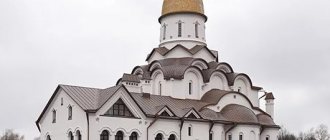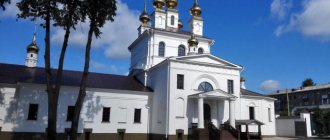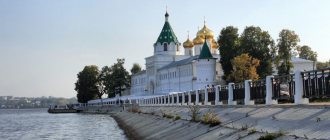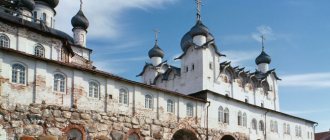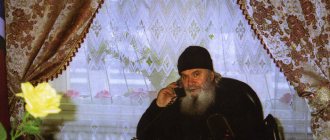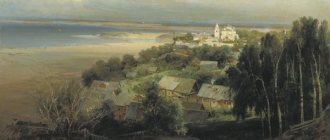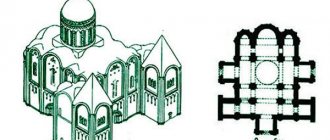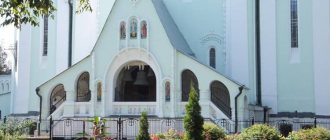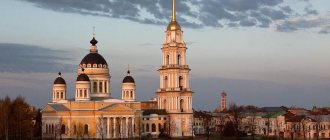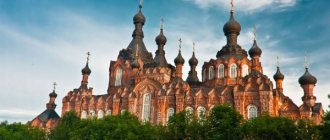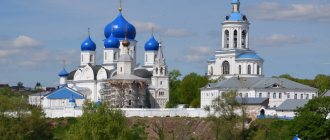Structurally, the Russian Orthodox Church and the Ukrainian Orthodox Church are divided into dioceses, metropolises, exarchates and other administrative-territorial units. Each diocese is under the control of a bishop. It includes church parishes, monasteries and other objects.
The Gorlovka and Slavic Diocese is part of the UOC and is subordinate to the Moscow Patriarchate. Geographically, it is located in the northern part of the Donetsk region.
Dioceses with which it borders:
- Dnepropetrovsk (in the west);
- Lugansk (in the east);
- Izyumskaya (in the north);
- Donetsk (in the south).
Main cities: Gorlovka and Slavyansk. They are called diocesan cities.
Epiphany Cathedral
General information
The Gorlovka diocese was created by separating from the Donetsk diocese more than 20 years ago - in 1994. It unites Orthodox churches and monasteries located in the northern regions of the Donetsk region.
It includes parishes and churches of Shakhtarsky, Slavyansky, Konstantinovsky, Bakhmutsky, Limansky, Toretsky and other districts. The main city of the diocese is Gorlovka, the second most important settlement is Slavyansk.
It is important! What is Honey Spas and what is the history of the holiday?
The current metropolitan of the Gorlovka and Slavic diocese is His Eminence Mitrofan (Nikitin), who has headed the diocese since January 2007, before which he was the rector of the Church of the Nativity of the Lord in Donetsk and a teacher of the New Testament at Donetsk National University.
Deaneries and monasteries
Since 2007, the diocese has been headed by Archbishop of Gorlovka and Slavic Mitrofan (Nikitin). He became an archbishop in 2013, having previously been a bishop.
The deaneries that make up the diocese are:
- Aleksandro-Nevsky, Serafimovsky - with its center in the city of Slavyansk;
- Bogoyavlensky, Nikolaevsky - with the center in the city of Gorlovka;
- Iovo-Pochaevsky, Nikolaevsky - with the center in the city of Konstantinovka;
- Troitsky, Uspensky - with the center in the city of Kramotorsk;
- Druzhkovsky, Alexandrovsky, Dobropolsky and other areas.
What Orthodox Christians need to know about their faith:
- How to choose a baptismal name
- How to use a Jerusalem candle
- On the storage of Orthodox icons
By 2015, there were 229 church communities and two convents in the territory - Sergievsky and Stefanovsky. The number of deacons, priests and bishops was 231 people.
Cathedral
The grandiose Epiphany Cathedral acts as the diocesan center, which received cathedral status relatively recently - in 2013. The temple was named in honor of the Epiphany of the Lord.
Due to military operations, the cathedral was never completed. Today, on the territory of the temple there is a Sunday school, children's and youth choirs, a Bible reading group, a youth group, a theater group and a Russian hand-to-hand combat section for teenagers.
Interesting! What does a nativity scene look like and what is it?
Classes in clubs are free and anyone can attend them.
The Epiphany Cathedral is located on Cathedral Square in Gorlovka and includes the Lower and Upper Churches. Nizhny is famous for its amazing iconostasis, the main place in which is occupied by the icons of the Savior and the Virgin Mary. These are both religious shrines and true works of art, which you can admire both in photos on the Internet and in person.
Schedule of the Epiphany Cathedral:
| Day | Time | Event |
| Daily | 16:00 | Evening Worship |
| Monday through Saturday | 07:30 | Divine Liturgy |
| Sunday | 06:30, 08:30 | Divine Liturgy |
| During Lent on weekdays | 07:00 | Divine Liturgy |
| Friday | 07:00 | Prayer service with reading of the akathist to the miraculous Pochaev Icon of the Mother of God |
| Every Sunday | After the Divine Liturgy | Sunday school classes |
There are other Orthodox shrines in the city of Gorlovka. Among them: St. Nicholas Church, Kazan Church and the Church of the Icon of Joy to All Who Sorrow. Unfortunately, most of the city's churches were damaged during the war in South-East Ukraine (2014–present).
Interesting! Defender from all evil Pansophius of Athos
In 2014, the magnificent Church of the Annunciation of the Blessed Virgin Mary completely burned down and was never rebuilt. Fortunately, during the bombing and fire, none of the clergy and parishioners were injured. According to His Eminence Metropolitan Mitrofan, out of 22 churches in Gorlovka, only 2 remained intact.
The second cathedral of the diocese is located on the territory of Slavyansk. The temple was built in honor of Alexander Nevsky. The cathedral received cathedral status in 1994.
Note!
Today, on the territory of the Epiphany Cathedral there is a free food point for residents of Gorlovka and its constituent areas.
Every day at 12:00 the cathedral refectory opens its doors to all the hungry and needy. Gorlovka Cathedral also provides free assistance to pregnant women who find themselves in difficult living conditions and difficult situations.
War and Peace of the Gorlovka Archpastor
“Today our priority is young talented guys whose eyes sparkle. We could provide them with comprehensive support so that, having received an education in a theological school, they would return back and help in implementing the tasks that the Church faces - educational, missionary, and social. But first of all, I would like them to be a good example for their flock, to believe in what they preach,” the ruling bishop of the diocese shares his main desire, in which fighting has not subsided for three years, from where priests fled out of cowardice, where Most applicants are afraid to return. But life does not stand still - sooner or later the war will end, and what a peaceful life will be like will depend on everyone who wants to build it.
Ten years ago, on the feast of the Presentation of the Lord, Metropolitan Mitrofan of Gorlovka and Slavs celebrated the first Divine Liturgy in the then St. Nicholas Cathedral of Gorlovka. Over the years, much has changed both in the cathedral city and throughout the diocese. How does the ruling bishop see the life of his diocese? What tasks does it pose? What changes in church life await us in the next ten years?
Leave the periphery
— Vladyka, what impression did the Gorlovka diocese make on you when you arrived at the department?
- The Gorlovka diocese has never been some kind of foreign and unfamiliar territory for me - from 1994 to 1997 I carried out obedience in Gorlovka next to Bishop Alypiy. I knew the local priests, I knew the rules. In general, the Gorlovka diocese is part of Donbass. For ten years, Metropolitan Hilarion of Donetsk and Mariupol ruled two dioceses, so it was quite difficult to perceive any difference between the Donetsk and Gorlovka dioceses.
Of course, Gorlovka is not the capital, it is a provincial town. And in order for the church life of Gorlovka to develop, in my opinion, first of all it was necessary to acquire some external attributes - it was necessary to build a cathedral, a diocesan administration. We needed personnel—people with whom we could implement some projects and start something new in diocesan life. Quite a lot had to be done to bring Gorlovka at least to the level of Donetsk, because in Donetsk church life was in full swing, but here it was a little on the periphery. It was noticeable and something that had to be worked on.
— Which plans for the past 10 years were implemented, which were not, and why?
— If we talk about the cathedral city, then we managed to do the most here. Church life in Gorlovka has changed, in my opinion, primarily due to the fact that a cathedral was built here, and due to the fact that new personnel appeared. They began to work more actively with young people and with people who, although they are outside the church fence, are also members of the Church, Christians.
Liturgy in the open air on the site of a temple destroyed by a shell in Kirovskoye
Maintain Unity
The last three years have changed a lot in the life of the diocese. Some plans were not destined to come true. We were unable to continue the construction of a spiritual and educational center and some churches. Several built temples were destroyed.
Despite the fact that over the course of three years the front line on the territory of the diocese changed several times, despite the difficult situation that arose on both sides as a result of this, we managed to keep the diocese intact. We were not divided into two parts, into two self-governing territories.
In both dioceses, Donetsk and Gorlovka, we have maintained the unity of both the clergy, who are on this and that side of the demarcation line, and the laity. There is a feeling that this is one big family, no matter which side you are on and which side of the front line the service is being held on. There are common rules, procedures, discipline, and the need for joint communication. This is also one of the significant achievements, because if you took one wrong step, showed partiality, did something, succumbing to emotions, and all this could not have happened today. It was possible to lose churches, clergy, and friendly communication.
Everything that is happening in the country, thank God, has not passed into the church fence. Today we have no division within the church fence. This suggests that the Church is not a sick, but a healthy organism. This gives us hope that when all the military and political turmoil ceases, we can serve as a good seed for restoring peace and normal relationships between people.
The priest begins with the entrant
Ordination
— How did the war affect the life of the diocese? What problems have arisen and are the ways to solve them clear?
— If we talk about problems, the most painful and difficult one is the personnel issue. I see that over ten years the number of young people who want to go to seminary, receive a theological education and then become priests has not increased, but decreased. This is happening not only in our diocese, it is a church-wide trend. Not only the quantity, but also, so to speak, the “quality” of applicants has fallen - both the general level of education and some human qualities.
I feel anxious for our future and for the future of our Church. If a young man is not interested in any knowledge, studies poorly, does not really understand why he wants to go to seminary, I am unlikely to be able to solve with him any serious problems that arise before the Church today, give him those obediences where he could show yourself as a shepherd.
Even in a football team there are substitutes, and the player on the field thinks that if he plays poorly, there will be someone else who will take his place, so he needs to try his best. I see that current candidates for ordination do not have such thoughts. Only a few of them show themselves. As for the rest, this service does not bring joy or benefit to them, nor to the diocese. This is problem.
Today our priority is young talented guys whose eyes sparkle. We could provide them with comprehensive support so that, having received an education in a theological school, they would return back and help in implementing the tasks that the Church faces - educational, missionary, and social. But first of all, I would like them to be a good example for their flock, to believe in what they preach, and to lead people.
Where are the other seven?
The second problem is that our diocese today has become a very unattractive place in terms of prospects and future. Family people have questions about the future of children, about the prospects of what is called earthly, human happiness. From this point of view, this territory is unattractive, dangerous, and service here for the clergy, especially in those parishes where there is a danger of explosions and destruction when hostilities resume, is ascetic service.
Ordination
Thank God that among our clergy there were many such ascetics - many more priests remained than left. But how can we get young people interested in coming here today?
On the other hand, this problem protects us from a large number of those people who would come to serve, as the people say, “not for the sake of Jesus, but for the sake of the bread.” Maybe it’s better that today it’s like this, and we don’t have a rush, an influx, or a line in the waiting room.
Even those seminarians who were sent here by order of the educational committee do not return to us. They find other, quieter dioceses. Of the nine applicants last year, only two returned. Where are the other seven? I don't even know. None of the bishops tells me. Either they refused altogether, changed their minds about serving, or they serve somewhere in other dioceses, but they do it quietly so that I don’t know about it.
Among the mass of clergy in each deanery there are several people whose eyes sparkle, who completely devote themselves to service, try to do everything for the Church, for the people. As a rule, the same person goes to school, to college, and to a nursing home. And, of course, they cannot cope with the amount of work that exists. “The harvest is plentiful, but the laborers are few” (Matthew 9:37). If people go there because they were forced, as a rule, such work does not bring any results. They can report that they were there, but if their eyes are dull, and they themselves came there only because they need to write a report, those people to whom they came see and feel it. Who will follow them, who will listen to them? It would be good if these responsible church obediences, which we talk about so often and a lot, were performed by those people for whom this is their favorite thing, who do not need to be forced and pushed.
I have great respect for the clergy who really work, who do a lot of work. We have many such priests, but there are not enough of them. I understand that they will not come from anywhere in honorable order, they need to be educated, raised, and this is a long process. This is one of the problems that hinders the development of church life in the diocese.
The front line moves, but people remain
— From time to time our priests are accused of supporting one of the warring parties. What position does the Church actually take in the armed conflict in Donbass?
Metropolitan of Gorlovka and Slavic Mitrofan
“Life itself tells us what our position should be.” Now the war has begun. A war between those people who make up your flock. Today these people are on opposite sides of the front line. In a conflict like the Donbass, it is quite difficult to talk about who started it first, who had more rights to take up arms, who had or did not have the right to attack, who broke the law and who did not break it.
War is a very dirty and ugly thing. Today everyone is tired of the war, especially those who are here on this territory - both military and civilians. A small percentage of people want to fight, for whom war is their internal state, and they need it in order for them to feel useful. Most people want the war to end.
The Church, finding itself in such conditions, on the one hand, is tempted, succumbing to emotions, to take someone’s side, but on the other hand, you understand that sooner or later the fighting will end. Sooner or later, any war ends in negotiations and a truce.
The Church is not called upon to give a political assessment of any events or interfere in the economy or military operations. After all, in fact, from the church’s point of view, it is not so important to us where the border will be, what language a person will speak. It is important for us that his soul comes to God, so that a person, being a child of the Church, does not find himself in a situation where he cannot cross the church threshold for some political reasons. So that he does not say: “I cannot go into the temple, because there is a priest here who says this and that, or preaches this and that, or calls for such and such.” But a priest is also a person, and he also has the temptation to publicly express his point of view...
We, it seems to me, have taken the only correct position: complete non-interference in politics. We do not comment in any way on the fighting, or on the political situation, or on the actions—either on this or that side—of those people who proclaim something and call for something. We are engaged in purely church business. We want the Church to become a place where any person, regardless of his political views, can come to get answers to the questions he asks God. Let others answer other questions.
When coming to a temple, a person should not worry about who serves in this temple, what political force he supports, or what he does. We are fulfilling this task. The front line moves, but people remain, they continue to go to church and pray to God. And the clergy remains with the people. For me, for example, there is no difference: praying with people on this side or on that side, this is all my flock. If I took some kind of political position, it would mean that some people would automatically stop trusting me as a clergyman. And not only me - any other priest. He would become a political opponent for them. This is exactly what we are trying to avoid. We are trying to ensure that people have the opportunity, at least in church, not to think or talk about politics, but to pray to God and think about the salvation of their souls.
There is no point in talking about peace and love with hatred in your heart, because no one will believe these words, no one will hear them. You need to talk about love with love, you need to talk about forgiveness when you are ready to bear this forgiveness and you yourself set an example of how to do it. And for the Church today this is an important task - so that those people who come to church, perhaps with hatred, with unforgiveness, leave it with the desire to love their neighbor and with the desire to forgive him, because without this no conflict will ever stop. This is a difficult task, but it must be solved.
A real priest will not allow himself populism
Many times they tried to accuse us of being involved in political activities, of supporting one of the parties, but when it came to the questions: who, when, where, what they said, what they called for - no one could provide such facts. Today, this gives us the opportunity to openly carry out our service on both sides of the demarcation line and calmly, confidently, and honestly look people in the eyes.
There are “wandering priests” who are not assigned to any parish or diocese, about whom we know nothing. They regularly appear on this side and then on that side. Everyone has their own goal: to take a photo, tell something, appear somewhere, then they are proud of it and flaunt it. I don't know why they need this. We cannot be responsible for them, because they are not our clergy, they did not receive blessings for their activities, no one sent them here. Often these are not even priests, but impostors in disguise, people generally far from the Church. What they talk about, what they preach, has nothing in common either with the Gospel or with church life.
Every priest and clergyman of a particular diocese has a decree from the ruling bishop. It is clear what parish he serves in, what church obedience he bears. And it is clear that for this he bears a certain responsibility both before the diocese and before the laws of the state in which he serves. Therefore, he cannot afford irresponsible things - stupid statements, populism and everything else that is inherent in these wandering tourers who are not responsible for anything, today here, tomorrow there. But this phenomenon is uncontrollable, spontaneous. It has absolutely no connection with diocesan church life. We also know about such facts, but we cannot influence them in any way, these are not our people.
In general, the diocese is a single whole organism, despite the fact that it is divided by the front line. Divine services are held regularly on both sides, and dean meetings are held once a month. Priests have the opportunity to come for appointments at the diocesan administration, I have the opportunity to travel when I need to, to serve the liturgy, to communicate with the clergy and monastics.
There are certain difficulties, but they are of a purely technical nature - where you could previously get to in an hour, now you need to drive six hours, and a trip that used to take a day now takes several days. But maybe this is a problem for us today, and the Far Eastern bishops will laugh at me - they have to get to their parish by helicopter or snowmobile. There is no need to think that these circumstances make life unbearable, and that service is somehow ascetic. This is an ordinary job that has become a little more difficult.
It is much more difficult to ensure that people, despite the injustice of everything that is happening, retain their human qualities, do not lose their Christian conscience, so that they have that red line that they can never cross, because they are Christians, because it is important for them to preserve your Christian title.
And logs and ribs
— Does Donbass have enough churches? What is more important now - building new ones or attracting people to existing ones?
- I can’t say that these things need to be opposed. There must be a parallel process. Where there are no temples, they need to be built. We have about a hundred parishes where people gather for worship in houses of worship and adapted premises. Let us look at least fifty years ahead: what will happen in this former recreation center, former military registration and enlistment office or former kindergarten? Today the community gathers there, people pray there, services are held regularly, there is a priest, these buildings are being renovated. But the prospect is the construction of a temple nearby or somewhere nearby, in a convenient location. The community is faced with the task of doing something about this. Every year you need to take at least a step forward so that a temple appears nearby.
Consecration of the Kazan Church in Gorlovka, 2014
Somewhere there is a need to open new parishes - where they have never existed. People want to have a church, they want to gather together and pray there, and they turn to the bishop with this request. As such requests and needs arise, we will open new parishes and build new churches. And this will in no way interfere with the main activity: of course, churches are built so that people go there.
We cannot attract people through some advertising campaign. We don’t say: come and everything will be fine and easy for you. It is generally difficult to live in the Church. I don’t know how you can attract people to the Church through human means. People are attracted to the Church only by the grace of God, when a person has questions inside him, and his whole previous life begins to seem somehow incomplete and imperfect without God and communication with Him. This leads a person to a religious quest and leads him to the Church.
Our task is to be a guide for such people, take them by the hand and help them take the next steps towards God. Introduce them into the full-flowing river of church life, sacraments, worship, traditions, Church Tradition, teach them everything that has been in the Church for two thousand years, so that they become members of the Church, members of the Body of Christ, conscious Christians. This cannot be done without the moral authority of the clergy. It is impossible to do this without having churches and without performing divine services.
I remember that quite recently the Patriarch spoke out that no events and no projects - educational, social, youth, or any other - can change a person. A person can only be changed by full-fledged church life, worship, participation in the sacraments - and this happens in church. Without a temple, a person will not change, he will not become different.
We need to do everything at the same time - bringing people to God, doing missionary work, preaching, and social work. The Church must perform works of love and mercy; for Christians this should be a natural manifestation of their Christian life. But at the same time we must continue to build churches.
This is also necessary in Gorlovka, the cathedral city. We have places where churches are not completed, where they were built and destroyed during hostilities, where they need to be restored, where construction began and stopped, because now it is impossible to continue it in these conditions. But life does not stand still. We hope the war will end and we will continue to do so. Many people come to God through the construction of temples, and this also should not be discounted.
“Non-church” activities of the Church
— What can the Church do to make people want to go to church and build a relationship with God? What areas of work in parishes have become priorities and is it bringing results?
— Why else is educational and missionary work being carried out? Why does a priest go to schools, why do Sunday schools? Why do we hold various public events - concerts, exhibitions, religious processions, literary evenings? Just for this.
Charity lunch
Why is social work carried out? By helping people with their material needs, we do not say that we will help you in exchange for you coming to Church and praying to God, but it still leaves some kind of mark on the soul. There is a possibility that these people will have some questions about their souls.
Any activity that the Church conducts, and which at first glance may even seem non-church - for example, some kind of festive concert organized by children - is aimed at leaving a good mark on the human soul and human heart.
We feed people. 400-500 people come to eat. 400-500 people come to services on major holidays. It is clear that there are much more people who come to eat than those who come to the service. But if out of these four hundred people at least four people who have not gone to service before go into the church to pray to God - first for a minute, and then, having heard something, stay for the evening service, come to confession and communion - it will be good fruit.
Why does a priest actively respond to invitations to various social events that, it would seem, have no direct relation to church life? To remind people that there is another side of life that is no less, but more important for a person than all other aspects.
We have sports sections where priests train children. It would seem that sports and church life should not intersect; they are not entirely on the same plane. A clergyman is not obliged to go to the sports section. But some of the athletes later become a member of the Church.
There are circumstances that bring a person directly to church. In this case, you need to talk to him about the most important thing, although it is not always with a question about the most important thing that a person comes to the temple. Here is a question for the clergyman: is he able to help a person realize this desire to come to the temple and receive something in the temple, the need to come there again and again, again and again, but perhaps not for what he came to? for the first time, but for the sake of which the Church exists. This is what the clergy and their assistants who are in the temple should do directly.
There are different ways to bring people to the temple. They depend on the place where the priest serves, the external environment, whether it is a village or a city, who is nearby - a military unit, or a hospital, or a nursing home, or a boarding school. The main thing is for people to feel that the priest loves what he does and loves them, and does not treat them as a consumer. Let the clergyman ask himself: am I doing everything to ensure that parish life changes for the better? So that people do not leave the temple, but, on the contrary, come? If this question exists, if a clergyman has a need to work not only within the church fence, but also outside it, if he is looking for opportunities to come to people, how to go out to meet them, then, I think, he himself it becomes clear what needs to be done and how to behave. Everything depends on us.
Difficulties can be overcome
—What is the most difficult thing in serving as a bishop?
— It’s hard to single out what’s most difficult. The hardest thing for me would probably be to do nothing. Or see that what you do is not needed by anyone. Of course, every person in life has disappointments when you put your soul, heart, and then see that it is not needed, or misused, or misunderstood. But this happens, probably, not only with the bishop.
When you are busy with your business, when you love this business, you understand the demand for the service that you have to perform, you perceive any difficulties that arise as not the most difficult. I had difficulties, but I was not in a situation where despondency, apathy, sadness win, and you don’t know what to do.
When you see that the temple that you built, which you put your soul into, is burning, and two shells fly into it - is it difficult? Yes, it is difficult. When a priest leaves a parish, it is also difficult. You probably experience approximately the same feelings at these moments. When people are killed, whom you knew, who were your parishioners, it is difficult. When there is slander, hatred, enmity with each other, or misunderstanding of what you want to explain, or misunderstanding of each other among the clergy - these are also difficult things. But these are not the difficulties that can lead to despair.
Long term under fire
— Can you share your plans for the future? What kind of diocese do you want to see in 10 years? In 50?
- The minimum is to preserve what we have, but this cannot be a plan. There are plans for further construction and decoration of the Epiphany Cathedral, putting in order those churches that have not yet been completed and that were damaged by military operations. I would like new personnel to appear, new people with whom it would be possible to implement all the tasks that the Church faces today.
I would like those documents that we adopt at the general church level, at the level of the Inter-Council Presence, and Bishops’ Councils, to be reflected in the life of our diocese and to be practically applied in parishes. We are working on this now.
Consequences of the shelling of the Iversky Church in Nikitovka
Of course, I would like the war to end so that we can make plans for the long term. I can give an example: in 2016, I decided to complete the construction of a church in Nikitovka - cover the roof, install domes and carry out plastering work inside, so that in 2017 I could install heating, plaster the outside, and the first services could begin there. We managed to import tiles before the war, and the windows were already there. The temple in the Byzantine style was small, but it was supposed to be very beautiful and cozy.
A church is needed in Nikitovka. What is there today, a prayer house in honor of St. Nicholas, rests on his word of honor. The walls and ceiling are sagging. In the near future, anything can happen to this building, and people will simply have nowhere to pray.
There were two direct hits on the temple under construction. There is no roof. The domes are broken, all the windows are broken. The plaster that they began to do in the dome was also damaged. The workers fled. They came to me: what should we do? I say, of course, leave. How can I guarantee the safety of your life? After all, it flew not only at night, but also during the day. That's where all the plans ended. And this applies to any aspect of life.
Tomorrow we will be what we do today
But I’m afraid that under the guise of war, when you can’t make any plans, some kind of relaxation may come - let’s just sit and do nothing. You can’t live like that either, because tomorrow we will be what we do today. Each diocesan department, each parish sets goals for itself for the year. I ask that these plans be presented to the ruling bishop.
I am now planning to meet with the clergy of each deanery separately in order to hear from each priest what he considers necessary to do to improve church life in the parish this year. Each parish has different tasks. What for one parish is a stage that has already been passed, for another it is a goal that they want to achieve in the foreseeable future. We work on this, formulate some goals and objectives for ourselves, and then at the end of the year we discuss what we managed to do, what we didn’t, and why. And I must say that this helps not to stagnate, but to move forward.
At the Boriso-Gleb parish in Chasov Yar
We will definitely not limit ourselves to just performing divine services. In every direction of church life, at least small steps forward must be taken. This is what we talk about with the clergy, with each other, at meetings of deans, at meetings with clergy.
Of course, it is not yet possible to talk about such global projects as the construction of a spiritual and educational center, which was started before the war. We cannot fully complete what still needs to be completed in the upper church of the Epiphany Cathedral, but this is not a reason to give up.
The price of success
Over the past ten years, I have realized that nothing worthwhile can be done at all, either in church life, or, probably, in everyday life, if you are not ready to give all your strength for the sake of what you are doing. Any person, if he sets a goal for himself, must first of all ask himself: am I ready to give everything I have, all my strength, abilities, talents, health, opportunities in order to achieve this goal? And if so, then the Lord answers this and sends grace, reason, blessing, and help. If not, I don’t even know how you can do something really big without this determination.
This is probably one of the most important things that all people who begin to work in the church field must understand: you need to be able to give everything you have, and not spare anything. Then help comes from God, and you begin to see His real participation in your life and in the lives of those people who surround you. While you are “idling”, none of this happens. This is my personal experience, which I would like to share with all people who want to achieve something in this life, to do something truly important for God and for their neighbors.
Official site
The official website of the Gorlovka diocese allows you to obtain information not only about the church community itself, but also about all the important events that take place on its territory.
Informative! Schedule of services in the Church of St. Andrei Rublev
By visiting the site, you can familiarize yourself with:
- history of the diocese.
- temples and monasteries.
- biography and famous sermons of bishops.
- educational programs: Sunday schools, choral singing, clubs, etc.
- important contacts.
- various useful and interesting materials.
- concerts and other events.
On the website of the Gorlovka and Slavic Diocese you can get information about free food points in Gorlovka and receiving humanitarian aid, which is provided to all those in need and victims of the military conflict in the South-East of Ukraine.
Important!
To make donations or receive assistance, you can write to the email address
Orthodoxy in Gorlovka
The diversity of the national composition of Gorlovka and the adjacent territories determined the presence in
the city of several religious groups, including various directions: Christianity, Islam, Judaism.
However, most of the city's population are Russians and Ukrainians who profess Orthodoxy, so a large number of Orthodox churches have been built on the territory of Gorlovka.
If previously the main parishioners of the Orthodox churches of the diocese were elderly people, in recent years there has been an increasing interest in religion among young people.
Interesting! Where are the relics of St. Spyridon of Trimifuntsky in Moscow?
Also, the Orthodox Church of Gorlovka is of considerable interest to children. At the Epiphany Cathedral there is a Sunday school “Rostok”, which can be attended by children from 2.5 years old.
Religious education
In addition, the Slavic and Gorlovka diocese is engaged in educational activities, namely:
- The curriculum of secondary schools in the region at the regional level includes subjects of a religious nature. The course is intended for children and is designed for 4-11 years of study. Lessons on Christian ethics are conducted, excursion trips to churches are carried out, and so on. There is cooperation between teachers and school psychologists together with clergy.
- On the basis of the churches there are Sunday schools for children from 2.5 to 15 years old (there are 105 schools in the diocese), where the Law of God is studied, the basics of applied and artistic creativity and other subjects are also mastered.
- Training classes on spiritual vocals are being created at the Houses of Arts and music schools. From the age of 6, children are taught the culture of liturgical singing, thus reviving folk choral singing traditions.
